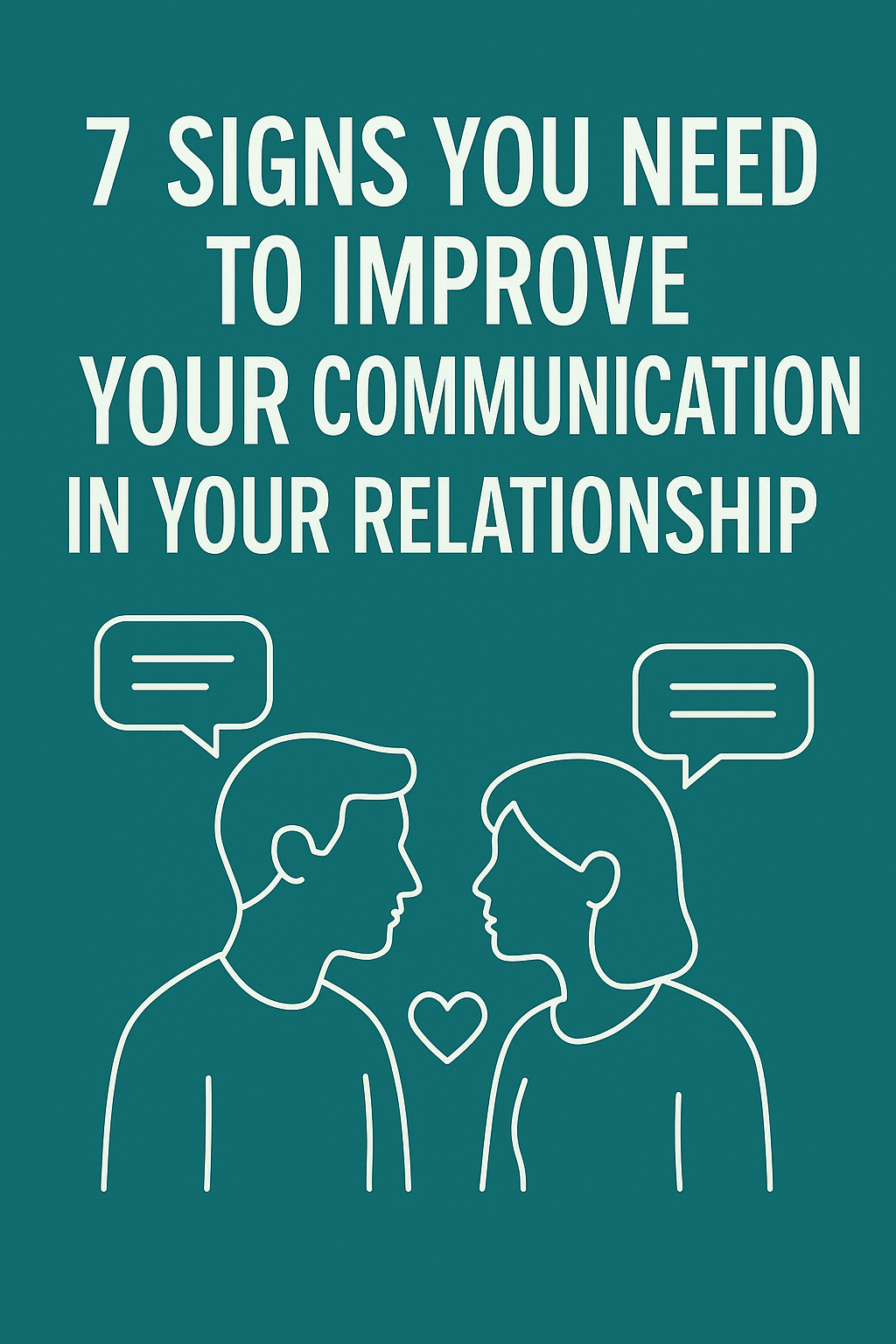Being able to talk to each other is the most vital factor in every healthy relationship
Partners who can be honest with each other about what they want, need, and feel create trust, get closer, and work through challenges in a constructive way. But a lot of couples don’t realize that they’re starting to talk to each other badly, which can cause fights, misunderstandings, and emotional isolation. In this entire tutorial, we’ll talk about seven distinct symptoms that your relationship needs better communication. We’ll also talk about the challenges that couples often have that impede them from connecting and provide you research-based advice on how to reconnect.
Talking to your lover isn’t the only way to communicate. It has to do with the way you communicate, the way you move your body, the things you say, and the way you feel. Talking to each other can make your relationship stronger, help you work together to solve difficulties, and make sure that both people feel heard and respected if you do it right. Long-term problems with communication can tear down trust, cause arguments, and make people feel like they aren’t as connected to each other.
The American Psychological Association states that improper communication is one of the major signals that a relationship will end badly and eventually break up. The Gottman Institute is well-known for its long-term research on couples. Researchers have shown that couples who “negative sentiment override,” or view neutral partner conduct as hostile, are much more likely to get divorced. Taking action when you observe early warning signs can affect the direction of your relationship.
Why it’s necessary to talk to each other in a positive way
It builds trust and connection
You are more likely to get harmed when you are honest with other people. Talking to your partner about your concerns, dreams, and regrets without judging them will help them understand how you feel, which will bring you closer together.
Helps to end arguments
There is no way to stop fights. People that are good at talking to others employ “I” statements, say what they want, and try to find solutions to problems instead of criticizing others. This stops things from growing worse and makes everyone happy with the results.
Improves control over emotions
Talking about how you feel stops it from growing worse. When partners name their feelings, such anger, hurt, or disappointment, they can deliberate about how to respond instead of responding on impulse.
Promotes Growth and Assistance
When partners talk about their objectives and challenges, they can assist each other improve, which keeps the relationship from being stuck.
Common challenges that couples face
- Emotional Reactivity: When you’re truly mad or stressed and can’t let it go, your body goes into fight-or-flight mode. This makes it hard to talk about problems in a calm way.
- Assuming you know what your partner is thinking: You can be wrong if you assume you know what your partner is thinking. Don’t assume; always ask for further information.
- Being defensive: Denying or attacking feedback won’t help; it will simply make things worse.
- Digital Overdependence: Texting for serious conversations makes them less deep and less emotional.
- Cultural and Gender Norms: Societal scripts that suggest things like “talk like a man” or “emotions are weak” might make it hard to be honest.
If these problems are fixed, people will be able to talk to each other in a better way.
7 Signs That You Need to Talk Better
- A lot of confusion and not getting things right
- How It Looks: You often felt that you weren’t understood, had to say the same thing again, or had to check to make sure everything was clear.
- Why It Matters: Misunderstandings can make individuals upset and lose trust over time.
- How to Get Better:
- Say “I” instead of “You never listen.” For example, you could say, “I feel like I’m not being heard when…”
- After your partner is done talking, remark, “So what you’re saying is…” to sum up what they stated.
- Ask inquiries that don’t have a clear answer if you want to learn more. For example, “Can you tell me more about how that made you feel?”
- Putting off challenging subjects for a long period
- What It Looks Like: You don’t want to feel uncomfortable, so you don’t talk about your plans for the future, money, or sex.
- Why It Matters: When difficulties aren’t dealt with, people can get angry and emotionally distant.
- How to Improve Things:
- In a peaceful, neutral setting, set aside time each week for “relationship meetings.”
- Set some rules: no name-calling, no interruptions, and time-outs if things get too heated.
- Defensiveness and Blame
- How It Looks: When someone gives you feedback, you say things like “Well, you…” or you don’t listen to what your partner has to say.
- Why It Matters: When you are defensive, you can’t genuinely grasp and fix problems.
- How to Get Better:
- Be conscious of yourself: When someone attacks you, pause and consider before you respond.
- If you want to demonstrate that you’re sorry, say “I’m sorry I snapped. I was really stressed out and didn’t deal with it effectively.”
- Not Paying Attention to How It Looks
- How It Looks: One or both partners are doing more than one thing at once, such looking at their phones, thinking about what to say, or zoning out.
- Why It Matters: When you don’t listen, your partner feels like they don’t matter.
- How to Get Better:
- Look someone in the eye and keep your body language open.
- Don’t use your devices during essential conversations so you don’t get sidetracked.
- Echo Back: Say, “I hear you saying X…”
- Putting too much faith on digital communication
- How It Looks: You mostly text or message, even when the topic is very emotional.
- Why It Matters: Texting is hard to grasp because it doesn’t have tone or nuance, and it also makes individuals less close.
- How to Make Things Better:
- Make it a point to talk to people in person or over video for critical conversations.
- Too many emojis can make things less apparent, so don’t use them too much.
- Set digital limits: agree on things like “no texting after 10 p.m.” or “no phones at dinner.”
- Little fights becoming worse
- How It Looks: Little things, like housework, can lead to large arguments.
- Why It Matters: Patterns of escalation train your brain to react more forcefully over time.
- How to Get Better:
- Stay on topic: Don’t bring up prior complaints that have nothing to do with the current situation.
- Set a “cooling-off” rule: if people start chatting too loudly, everyone has to stop for 20 minutes.
- Use Humor and Love: A funny quip or a soft touch can help things calm down.
- Not being near and having emotional distance
- How It Looks: You don’t display affection as much, and you feel more like roommates than lovers.
- Why It Matters: Not being able to talk to someone can make you unhappy in the long run.
- How to Get Better:
- Make time for “love dates” where you and your partner spend time together without any devices.
- Say something kind to your partner every day to show them how much you care.
- Be honest: If you want to become connected to someone again, tell them about a phobia or dream.
Ways to utilize proof to improve communication
- Gottman’s “Soft Start”
Say “I’d love your help with…” instead of “You never…” to start tough talks. - Nonviolent Communication (NVC)
Created by psychologist Marshall Rosenberg. It is centered on being explicit about what you need and how you feel and listening with empathy. - Exercises for Mindful Listening
One person talks for three minutes without anyone else talking or making noise. Then they trade positions. - Emotion-Focused Therapy (EFT)
EFT helps couples build strong bonds by teaching them how to understand and modify how they feel. - Writing in a communication journal
Writing about the things that make you feel bad in relationships can help you figure out how you feel before you talk to someone in person.
Talking to People in Real Life: Exercises
- Daily Check-In Routine
Every day at the same time, talk about the greatest and worst portions of your day for five minutes. Keep on listening. - Thoughts on the “Gratitude Sandwich”
When you deliver constructive criticism, start with a true compliment, talk about the problem, and then say thank you. - The “Mirroring” Method
One person says something, and the second person repeats it until the first person confirms that it is correct. Switch roles. - Letters
Write a heartfelt letter to say things you can’t say in person.
Questions That Are Often Asked
Q1: How long does it take for communication to get better?
A: Progress is different for each pair, but after 2 to 4 weeks of structured workouts and soft starts, many couples see good results. You need to be consistent.
Q2: Is bad communication the only thing that can end a relationship?
A: Yes. Surveys suggest that inadequate communication is one of the top reasons couples break up or get divorced.
Q3: Do issues with communication require couples therapy?
A: Not always, but a skilled therapist can help you figure out what works best for you. Professional help is helpful for difficulties that last a long time or fights that happen a lot.
Q4: What should I do if my partner is on the defensive?
A: Start by being upfront and honest. Be nice, admit when you’re wrong, and help each other remember what happened instead of blaming each other.
Q5: What do you do if your partner doesn’t want to talk to you?
A: Know how you talk to other people and what you can and can’t do. You can learn how to deal with stress and set appropriate limits through individual treatment or coaching.
Q6: Do digital tools like apps help?
A: Some apps, like Gottman Card Decks and Lasting, can help you talk about deep things. Don’t use them instead of chatting to people in person; use them as extras.
Q7: How do cultural differences change the way people talk to one other?
A: It’s really vital to know where each other is from and how they like to talk to each other. Talk about what you want and be ready for things to change.
Last Thoughts
Just because you don’t get along with someone doesn’t mean you have to break up with them. You can find out where you need to work on yourself by searching for the seven warning signs: misconceptions, avoidance, defensiveness, passive listening, over-reliance on technology, escalation, and emotional distance. Use techniques that have been demonstrated to help, such as soft starts, careful listening, and planned activities. You may reestablish trust, get closer to each other, and transform fights into chances to connect if you practice, show empathy, and be open.
When you invest money on communication, it’s like spending money on your relationship’s long-term satisfaction. Set up a quick check-in with your partner today and implement one of the ideas in this article to improve your relationship.
References
- American Psychological Association. Relationships: The good, the bad, and the ugly. https://www.apa.org/news/press/releases/1992/05/relationships
- Gottman Institute. The Four Horsemen and Their Antidotes. https://www.gottman.com/blog/the-four-horsemen-the-antidotes/
- Verywell Mind. What Is Trust in a Relationship? https://www.verywellmind.com/what-is-trust-in-relationship-4585300
- Gottman Institute. The Magic Five Hours. https://www.gottman.com/blog/the-magic-five-hours-two/
- Psychology Today. The Power of Emotional Awareness. https://www.psychologytoday.com/us/blog/compassion-matters/201911/the-power-emotional-awareness
- Harvard Business Review. How to Give Constructive Feedback. https://hbr.org/2018/09/how-to-give-constructive-feedback
- Common Sense Media. How Technology Affects Teen Relationships. https://www.commonsensemedia.org/articles/how-technology-affects-teen-relationships
- Gottman Institute. Take Time for a Friendship. https://www.gottman.com/blog/take-time-for-a-friendship/
- Gottman, J., & Silver, N. (2015). The Seven Principles for Making Marriage Work. Harmony Books.
- Psychology Search. Emotionally Focused Therapy (EFT). https://www.psychsearch.net/eft.php
- Harvard Health Publishing. Writing Your Way to Wellness. https://www.health.harvard.edu/mind-and-mood/writing-your-way-to-wellness





































I like what you guys are usually up too. This type
of clever work and reporting! Keep up the superb works guys I’ve included you guys to our blogroll.
It’s very simple to find out any topic on web as
compared to textbooks, as I found this piece of writing at
this web page.